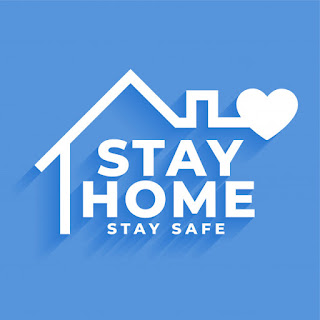STAY HOME AND STAY SAFE
“Home Is a Shelter From Storms - All Sorts Of Storms.”
- William J.Bennett
 Families
across the country are adapting to the evolving changes in daily life caused by
the COVID-19 pandemic. Most schools, places of public gathering, and
nonessential businesses are closed, and parents and other caregivers are faced
with helping their families adjust to the new normal. This includes trying to
keep children occupied, feeling safe, and attempting to keep up with schoolwork
as best as possible. It is very important to remember that children look to
adults for guidance on how to react to stressful events. Teaching children
positive preventive measures, talking with them about their fears, and giving
them a sense of some control over their risk of infection can help reduce
anxiety. This is also a tremendous opportunity for adults to model for children
problem-solving, flexibility, and compassion as we all work through
adjustmenting daily schedules, balancing work and other activities, getting creative
about how we spend time.
Families
across the country are adapting to the evolving changes in daily life caused by
the COVID-19 pandemic. Most schools, places of public gathering, and
nonessential businesses are closed, and parents and other caregivers are faced
with helping their families adjust to the new normal. This includes trying to
keep children occupied, feeling safe, and attempting to keep up with schoolwork
as best as possible. It is very important to remember that children look to
adults for guidance on how to react to stressful events. Teaching children
positive preventive measures, talking with them about their fears, and giving
them a sense of some control over their risk of infection can help reduce
anxiety. This is also a tremendous opportunity for adults to model for children
problem-solving, flexibility, and compassion as we all work through
adjustmenting daily schedules, balancing work and other activities, getting creative
about how we spend time.
STAY CALM, LISTEN, AND OFFER REASSURANCE
·
Be
a role model. Children
will react to and follow your reactions. They learn from your example.
·
Be
aware of how you talk about COVID-19.Your discussion about COVID-19 can increase or decrease your
child's fear..
·
Explain
social distancing. Children
probably don’t fully understand why parents/guardians aren’t allowing them to
be with friends. Tell your child that your family is following the guidelines
of the Centers for Disease Control and Prevention (CDC), which include social
distancing..
·
Demonstrate
deep breathing. Deep
breathing is a valuable tool for calming the nervous system. Do breathing
exercises with your children.
·
Focus
on the positive. Celebrate
having more time to spend as a family. Make it as fun as possible. Allow older
children to connect with their friends virtually.
·
Offer
lots of love and
affection to family members.
BE HONEST AND ACCURATE
·
Correcting
misinformation. Children often imagine
situations worse than reality; therefore, offering developmentally appropriate
facts can reduce fears.
·
Explain
simple safety steps. Tell
your child this disease spreads between people who are in close contact with
one another, when an infected person coughs or sneezes, or when one touches
infected objects or surfaces.
·
Zoonotic Diseases. Coronaviruses are zoonotic diseases, meaning they spread
from animals to humans.
KEEP EXPLANATIONS AGE-APPROPRIATE
Give
simple examples of the steps people make every day to stop germs and stay
healthy, such as washing hands. Use language such as "adults are working
hard to keep you safe."
For all children, encourage them to verbalize
their thoughts and feelings. Be a good listener!
STAY CONNECTED TO SCHOOL
#StayHome, #StaySafe, #Covid19, #CoronaVirus, #Diseases, #BeSafe, #BestSchool, #CBSESchool, #DPS, #DPSSahibabad



Comments
Post a Comment